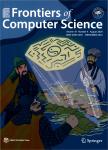Recent progress and trends in predictive visual analytics
Recent progress and trends in predictive visual analytics作者机构:State Key Lab of Computer Aided Design and Computer Graphics Zhejiang University Hangzhou 310058 China College of Science Zhejiang University of Technology Hangzhou 310023 China College of Computer Science and Technology Zhejiang University of Technology Hangzhou 310023 China School of Computing Informatics and Decision Systems Engineering Arizona State University Tempe AZ 85287-8809 USA
出 版 物:《Frontiers of Computer Science》 (中国计算机科学前沿(英文版))
年 卷 期:2017年第11卷第2期
页 面:192-207页
核心收录:
学科分类:12[管理学] 1201[管理学-管理科学与工程(可授管理学、工学学位)] 08[工学] 081304[工学-建筑技术科学] 0813[工学-建筑学]
基 金:This work was supported by National Basic Re- search Program of China (973 Program) (2015CB352503) Major Pro- gram of the National Natural Science Foundation of China (61232012) the National Natural Science Foundation of China (Grant Nos. 61303141 61422211 u1536118 u1536119) Zhejiang Provincial Natural Science Foundation of China (LR13F020001) the Fundamental Research Funds for the Central Universities the Innovation Joint Research Center for Cyber- Physical-Society System and the United State's National Science Founda- tion (1350573)
主 题:predictive visual analytics visualization visual analytics data mining predictive analysis
摘 要:A wide variety of predictive analytics techniques have been developed in statistics, machine learning and data mining; however, many of these algorithms take a black-box approach in which data is input and future predictions are output with no insight into what goes on during the process. Unfortunately, such a closed system approach often leaves little room for injecting domain expertise and can result in frustration from analysts when results seem snurious or confusing. In order to allow for more human-centric approaches, the visualization community has begun developing methods to enable users to incorporate expert knowledge into the pre- diction process at all stages, including data cleaning, feature selection, model building and model validation. This paper surveys current progress and trends in predictive visual ana- lytics, identifies the common framework in which predictive visual analytics systems operate, and develops a summariza- tion of the predictive analytics workfiow.



